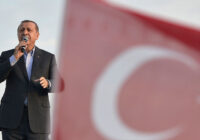Naming and shaming the Muslim Brotherhood, at considerable diplomatic and social cost and for little discernible benefit, is a policy idea that should never be allowed to see the light of day.
It’s a muggy summer morning in Washington, and the United States has just named the Muslim Brotherhood a foreign terrorist organization. In a White House press conference, President Donald Trump positions the move as part of his strategy to defeat global terror and a precursor to his Middle East peace plan, provoking a flurry of clarifications from the press corps.
The designation rocks already delicate ties with Turkey. Behind closed doors, a tense Recep Tayyip Erdoğan excoriates the Brotherhood sanctions, claiming the true face of terrorism belongs to Turkish cleric Fethullah Gulen, who should finally be extradited from the US to Ankara. Turkey breaks off talks to buy American air defense missiles and expedites a lira-denominated trade mechanism to purchase Iranian oil.
Abdel Fattah el-Sisi of Egypt calls to congratulate the president on his shrewd understanding of the Arab world as Egyptian military forces shutter schools and charities in Cairo, arresting dozens of alleged clandestine Brotherhood activists.
In Gaza, Hamas launches a 1,000-rocket barrage into Israel in solidarity with the Brotherhood. The barrage provokes days of retaliatory Israeli airstrikes that shatter Egyptian-brokered efforts at a long-term truce. Weekly Friday protests in eastern Gaza swell into the tens of thousands.
In Qatar, the Taliban cast the Brotherhood sanctions as an attack on Islam. They use it as a pretext to pull back from the negotiating table, gaining leverage in talks with US diplomats to end the war in Afghanistan.
Stalled Efforts
None of this has actually happened, of course. But all of it is possible if Washington proceeds with designating the Brotherhood, an aspiration the White House press secretary confirmed on April 30. A foreign terrorist organization listing under the US Immigration and Nationality Act, which appears to be the preferred course of action, would impose asset freezes and travel restrictions on Brotherhood members or affiliates.
This isn’t the first time that Washington has flirted with blacklisting the Muslim Brotherhood. The idea has been percolating in American public policy circles for years. Most recently, legislation proposing to designate the Brotherhood was introduced in US Congress in 2015 and again 2017, but never gained political traction. Those efforts stalled for a reason, and not just because of the unpredictable geopolitical consequences. The problems with sanctioning the Brotherhood are much more fundamental.
They start with the simple, tactical issue of enforcement. The Muslim Brotherhood is a transnational movement, not a unified group. Structurally, it is a loose network of national chapters spread across the Middle East and North Africa, North America and Southeast Asia. While the chapters act independently, they share ideology and informal personal, financial and logistical ties. That structure, along with the many levels of membership within the movement, makes for a poor sanctions target.
Absent clear guidance on how to define a Muslim Brother, the financial sector will likely respond to sanctions with extreme caution and exit any clients with suspected links to the movement. Such broad de-risking has serious social consequences. Brotherhood chapters operate charities, schools and hospitals, sometimes providing funding to these organizations unbeknown to the people who use them. International charities already struggle with access to financial services as banks implicitly prioritize compliance with terrorism finance regulations over humanitarian concerns. Reinforcing this trend would materially harm vulnerable people that depend on social services provided by the Brotherhood, but do little to deter violent extremism.
Strategic Questions
There is also the strategic question of what Muslim Brotherhood sanctions aim to achieve. A US designation would legitimize the actions of Egypt and American allies in the Gulf that already name the Brotherhood a terror group. It would also provide political cover for continued crackdowns on Brotherhood affiliates in those countries. Cairo and Riyadh might breathe a little easier knowing they have express American permission to squeeze their adversaries at home, but Washington would gain little from this, and local civil societies would certainly suffer.
Further, if Washington’s goal is to discourage violence and promote more productive political engagement by Brotherhood affiliates, it is hard to see how a blanket ban adds value. There are undoubtedly pockets of extremism in the Brotherhood movement. Indeed, some Western security services consider membership to be a potential lead indicator of an individual’s propensity toward violent extremism. But the movement has affiliates in the parliaments of multiple countries, and the most violent Brotherhood chapters, such as Hamas, are already subject to US sanctions. Targeted diplomacy, intelligence sharing and law enforcement cooperation aimed at specific cells or chapters that embrace violence would be far more effective.
Finally, there is the integrity of sanctions to consider. As former US treasury secretaries have noted, sanctions are most potent when used judiciously, with international partners and against targets justifiable on moral or technical grounds. Yet since 2017, US sanctions have risen to record levels. With the terrorist designation last month of Iran’s Revolutionary Guard Corps, they have also begun to take aim at overtly political targets. Doing so again with the Muslim Brotherhood would risk putting more strain on a diplomatic tool the credibility of which is already under severe stress.
With a maximum pressure campaign against Iran, negotiations with the Taliban, region-wide counterterrorism efforts and a new Israeli-Palestinian peace plan on the way, Washington has an ambitious Middle Eastern agenda. To achieve it, the US needs to recognize that its regional aims are intertwined. American envoys will face the same core constituents and regional power brokers time and again, armed with limited political capital and leverage. With so much at stake, naming and shaming the Muslim Brotherhood, at considerable diplomatic and social cost and for little discernible benefit, is a policy idea that should never be allowed to see the light of day.
The views expressed in this article are the author’s own and do not necessarily reflect Fair Observer’s editorial policy.
Support Fair Observer
We rely on your support for our independence, diversity and quality.
For more than 10 years, Fair Observer has been free, fair and independent. No billionaire owns us, no advertisers control us. We are a reader-supported nonprofit. Unlike many other publications, we keep our content free for readers regardless of where they live or whether they can afford to pay. We have no paywalls and no ads.
In the post-truth era of fake news, echo chambers and filter bubbles, we publish a plurality of perspectives from around the world. Anyone can publish with us, but everyone goes through a rigorous editorial process. So, you get fact-checked, well-reasoned content instead of noise.
We publish 2,500+ voices from 90+ countries. We also conduct education and training programs
on subjects ranging from digital media and journalism to writing and critical thinking. This
doesn’t come cheap. Servers, editors, trainers and web developers cost
money.
Please consider supporting us on a regular basis as a recurring donor or a
sustaining member.
Will you support FO’s journalism?
We rely on your support for our independence, diversity and quality.







